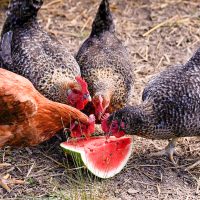Chicken Care 101: To Feed or Not to Feed – Nutritional Guidelines for Chickens

Thinking about adding chickens to your family? In this five-part blog series, we’ll cover the basics to help you decide if bringing chickens into your life is the right choice for both you and the birds. You’ll learn about chicken adoption, safe housing, medical care, proper diet, and the importance of social and emotional care.
In this post, we’ll discuss the nutritional needs of chickens, what foods to stay away from, and even some recipes for special treats! Please be sure to read article 1: Adopting Backyard Chickens, article 2: Housing, and article 3: Happy, Healthy Chickens before making any decisions about rescuing chickens.
Content is provided by Piedmont Farm Animal Refuge, a non-profit rescue and sanctuary for farm animals located in Pittsboro, North Carolina. Open for tours, volunteering, and more. Learn about the Refuge at www.piedmontrefuge.org and find more information at the bottom of this post.
What to Feed Your Chickens
A proper diet is one of the most important things you can provide to your chickens to ensure their health and happiness throughout their lives. Improper diets or toxic foods can lead to a myriad of health issues and even an early death. Providing your chickens with a consistent nutritious diet is absolutely essential to proper care. Unfortunately, there is a good deal of misinformation out there regarding this topic, so we’ll begin by answering some common questions about what to feed your chickens. This section assumes that you are caring for “heritage breed” chickens. If you have birds who have been selectively bred for the meat or egg industries (including Cornish Crosses, White Leghorns, or Rhode Island Reds), special diets must be provided. Contact us at info@piedmontrefuge.org for further guidance or questions.
Q: Can my chickens live off of food scraps (aka items considered household compost)?
A: No. While there are some fruit and veggie scraps that your chickens would certainly enjoy eating, providing scraps as the sole source of food does not provide all of the nutrients necessary to meet your chickens’ basic needs. Additionally, many items that agree with our bodies end up being toxic or poisonous to chickens, as we will discuss in more detail later in this article
Q: Chicken scratch is what my chickens should be eating daily, right?
A: No. “Chicken scratch” can vary depending on the company that makes it, but it is generally composed of a variety of seeds and grains. It is basically the equivalent of candy for chickens. Your chickens will LOVE it, but it is missing a lot of important components. You wouldn’t feed your children three square meals of candy a day, so don’t do that to your chickens either.
Q: So what should I feed my chickens?
A: The answer is quite simple: chicken pellets. Chicken pellets have been specifically formulated to have the correct balance of vitamins, minerals, and other nutrients that most chickens need. You can find them at your local farm or feed store, or even order them online. When deciding on the brand, look for a vegetarian pellet. Even though chickens are omnivores, non-vegetarian pellets often contain items that your chickens would never choose to eat on their own (such as fecal matter, bone meal, blood meal and other waste products from the factory farming industry – yuck!). Additional treats are totally appropriate in small amounts, as we will get into later in this article.
How and When to Feed Your Chickens
Chickens should receive fresh pellets every single day. Pellets that are left out for longer can develop mold, go sour, or otherwise become unhealthy or undesirable. Left-out food can also attract evening predators, so picking it up daily is a good habit to get into. Generally speaking, chickens should be fed in bowls or troughs that keep food off of the ground, helping to avoid the spread of parasites that can be found in their poop. Chickens should be fed in the morning and be allowed to freely eat throughout the day at their leisure. The amount of food they will consume will vary depending on the season and how much access they have to plants and insects in their area. Your goal should be a small amount of pellets leftover at the end of each day (which you will discard in the trash or compost pile). If you find a lot of leftovers, feed slightly less the next day. If you find the bowls empty, feed more the next day. Adjust the amount you feed based on what your chickens are telling you. This will ensure they are always getting enough food without much of it going to waste.
What NOT to Feed Your Chickens
As mentioned previously, some foods that humans eat regularly can be harmful or deadly to your chickens. In general, it is healthiest to stay away from any processed foods, as they can contain a lot of salt, sugar, and other unsafe ingredients. In addition to human foods, some plants that grow naturally (or that you may have planted in your landscaping) can be toxic to your birds. Below are lists of common foods and plants that you should keep away from your chickens. If you are unsure of how to identify plants growing in your yard, call your local Agricultural Extension Office or check with your local Botanical Garden. You may be able to get someone to come check out your property, or you may be able to bring in a sample cutting to be examined by an expert.
Foods to Avoid
• Processed foods (including chocolate, coffee, and alcohol)
• Anything with mold on it
• Anything that is going rotten
• Avocados
• All citrus fruits
• White potatoes (cooked sweet potatoes are ok)
• Onions
• Leaves from rhubarb, tomato, or eggplant
• Uncooked raw or dried beans
Plants to Avoid
• Black locust: Robinia pseudoacacia.
• Bladderpod: Glottidium vasicarium.
• Death Camas: Zigadenus spp.
• Castor bean: Ricinus communis.
• European black nightshade: Solanum nigrum.
• Corn cockle: Agrostemma githago.
• Horsenettle: Datura stramonium.
• Milkweed: Asclepias tuberosa. And other varieties.
• Mushrooms: Amanita spp. Death Cap, Destroying Angel, Panther Cap. Extremely deadly and poisonous if ingested.
• Jimsonweed: Datura stramonium.
• Poison hemlock: Conium maculatum.
• Pokeberry: Phytolacca americana.
• Rosary pea: Arbus precatorius.
• Water Hemlock: Cicuta spp.
• White snakeroot: Ageratina altissima
Chicken Treats!
Your chickens can (and should!) get treats on a regular basis. You will want to ensure that the majority of the calories they consume are from their regular diet of chicken pellets. However, there are a variety of healthy foods that will brighten their day. Some all-time fan favorites are raisins, chicken scratch, watermelon, and cooked sweet potatoes. Berries, such as blueberries or blackberries, are also a big hit – just be sure to cut them to an appropriate size to prevent choking. At the bottom of this post we’ve included some simple recipes for chicken treats that you and your family can easily make!
Feeding Eggs to Your Chickens
We decided this topic needed its own section altogether. Feeding eggs back to your chickens has become a common practice at animal rescues and private homes alike. Although at first glance this may strike you as unnatural or cannibalistic, cooked eggs are actually an important source of nutrients for chickens and, as it turns out, are one of their favorite treats. When you stop and consider just how many eggs the average hen has been bred to lay (around 200 a year for most heritage breed chickens) and compare this to the laying habits of the chicken’s ancestor (at only 10-12 eggs a year) you can understand that recycling those calories and nutrients is actually one of the healthiest things you can do for her. Sometimes a hen will crack open an egg that she has just laid and consume it raw. While some people view this as a nuisance, it is actually usually a sign that your bird is deficient in a nutrient and is trying to correct this imbalance herself. As a treat, we recommend hard-boiling the eggs and mashing them up with a potato masher (shell and all) until the shell is in small pieces (about the size of a green pea or smaller). They will eat all parts of the egg and it will aid in their overall health and happiness. Unless you are caring for chickens bred for intensive egg production, eggs should be provided as a treat at no more than a few times a week.
Recipes for Your Chickens
Chicken Trail Mix
1 cup cracked corn
1 cup black sunflower seeds
1 cup uncooked millet
1 cup fresh green peas
1 cup uncooked rolled oats
1 cup raisins
1 Tablespoon ground flax seed
Mix all ingredients in a bowl or small bucket. Give 2-3 Tablespoons per chicken. Mixture will keep in the fridge for up to 1 week.
Summer Fruit Pops
5 fresh strawberries
1 banana, peeled
1 small handful of blueberries
1 cup of water
Blend all ingredients together using a blender or food processor. Pour into a mini-muffin tin or ice trays and place in freezer. Give one cube per chicken on a hot summer day.
Egg Salad
10 hard-boiled eggs
2 cups of kale or collards, finely chopped
½ cup shredded carrots
½ cup shredded apples
1 clove of garlic, minced
Mash hard-boiled eggs with a sturdy potato masher until the shells are broken up in small pieces, the size of a green pea or smaller. Finely chop greens until they are the size of a quarter or smaller. Shred apples and carrots, ensuring the shreds are short in length. Mince garlic – it’s a natural de-wormer and thus a great addition to sneak into this dish! Mix all ingredients together in a bowl. Serve ½ cup per bird. Mixture will keep in the fridge for up to 4 days.
Now you know how to keep your chicken family well fed! Stayed tuned for our final blog post on social and emotional health for your birds. As always, reach out to us with questions at info@piedmontrefuge.org.
Content provided by:
Lenore Braford
Founder & Shelter Manager
Piedmont Farm Animal Refuge
www.piedmontrefuge.org
www.facebook.com/PiedmontFarmAnimalRefuge
www.instagram.com/piedmont_farm_animal_refuge

